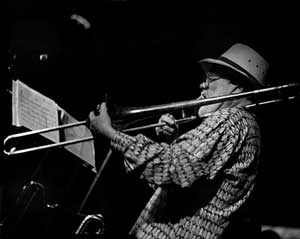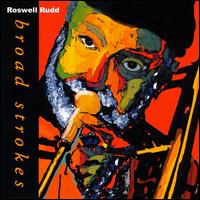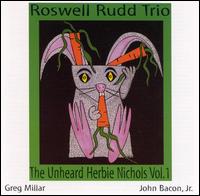
A
FIRESIDE CHAT WITH ROSWELL RUDD
I once saw Roswell Rudd play a show with Steve Lacy where he rapped about
soap. At the time, in the confusion, I was unable to fully appreciate
what it was he was doing. I thought it was avant, but now (with maturity
and the grace of wisdom in age) I have come to realize that if anything,
it was at least interesting, which is far more than I can say for most
of the music that is coming down the pipe these days. I was blown away
that Verve had the brass to put out a Lacy with Rudd release (but they
also released the Cecil Taylor, Dewey Redman, and Elvin Jones ditty last
year). The trombonist and I spoke about his collaborations with Lacy,
his time with the New York Art Quartet, and his new release on the Knitting
Factory house label, Broad Strokes, unedited and in his own words.
FRED JUNG: Let's start from the beginning.
ROSWELL RUDD: My father was an amateur drummer, who played just about
every day in the living room from the time I was born. He played along
to recordings. These would be very old recordings from the Twenties, Thirties,
and Forties. This was a sound that was in my life from the earliest of
times. One thing I noticed about my father when he played were the different
expressions that came across his face, only when he played the drums.
They indicated to me, even then, that he was going somewhere else when
he played. I was aware of another world where music and sound could take
you. I liked the idea of that world being a groovy place. I started taking
melophone in the grammar school band when I was nine or ten years old.
Then I moved up to the French horn in a couple of years, but there were
no French horn players on the jazz records, so the closest thing in sound
was the trombone and so I asked my folks to get a trombone and they found
somebody who was going down to a town where they had a pawn shop there
and they brought me back a trombone and I started playing that along with
the records. Pretty soon, I was playing that in school. That being the
music that I started with, I pretty much stayed with that. What I liked
about that music was the fact that the instruments sounded like people
talking and laughing, vocal sounds. Each of the players on these different
records, even though they might be playing the same instrument, they were
all distinguishable from each other because it was their personalities
that they were projecting through the music and I found that very colorful
and exciting and kind of theatrical. These elements of the music have
remained in tact for me and I have just tried to develop them on my own
and I've always sought out other musicians in whom I heard a similar process
going on.
FJ: Who are some of these musicians?
ROSWELL RUDD: Well, the earliest one and the one who really clinched it
for me as far as what I was going to do for the rest of my life was when
I heard Louis Armstrong play. That was such a thrill for me, I decided
right then and there that if I could somehow create the experience that
he created for me that day, that I would try to create that experience
for other people. I would make that my calling. I started to hear some
other jazz. I'm talking about live. Jazz at the Philharmonic, this is
where you get your underage kind of concerts, no alcohol being served.
It was just a good place to go and listen to real upscale jazz musicians
in a jam session kind of format. There were other clubs that I liked to
go to, Birdland, the Half Note.
FJ: So how does one go from listening to something as tame as the Jazz
at the Philharmonic to performing with advanced progressives like Cecil
Taylor, Bill Dixon, and John Tchicai?
ROSWELL RUDD: Well, the music I grew up with was one that depended on,
leaned very heavily on collective improvisation. The music of my contemporaries,
when I was in my twenties in New York City, they were calling it avant-garde,
but it leaned very heavily on collective improvisation. That's how I was
able to go from one traditional generation to another traditional generation
because they both involved collective improvisations and there is probably
a continuum that you could find in improvised music anywhere in the world,
collective improvisational things. What I really needed to study was bop
and fortunately I had some help there. I had a great teacher who was playing
in a traditional band and the small bop combos. He knew how to find a
part for himself, play a role in either situation. He was able to show
me some things about bop that would supplement my experience and my knowledge
in collective improvisation. That was sort of the thing that was missing
for me. Herbie Nichols was very helpful because he was really a high bop
composer and performer and the experience that I had with Steve Lacy,
the great saxophonist following Thelonious Monk around, that was very
helpful too. But I am still going to be studying music the rest of my
day. You really never know enough. The new material and the future of
what you do comes from improvisation and so any kind of a way or system
or no system at all really that will generate a situate where there is
improvising is going to give you your future musically. This is where
all the new stuff has come from for me, from improvisation. I guess that
is why it is so important for me to keep improvising.
FJ: You have been a champion of Herbie Nichols' music.
ROSWELL RUDD: Yeah, Herbie Nichols was an artist. He was a storyteller,
a writer, a great chess player, a trickster, a fine accompanist to many
singers, and wrote material in many different genres from cabaret shows
to West Indian music. He was very knowledgeable, but again, a student,
an eternal student. He was not a great entrepreneur. So as far as being
a bandleader and a hustler, I didn't learn any of that from Herbie, but
I did learn so very artistic devices and intricacies about composition
and improvisation and style in this music of ours.
FJ: Let's touch on the New York Art Quartet.
ROSWELL RUDD: That formed at the beginning of 1963. We kept that going
until the end of '65 and then John (John Tchicai) went back to Denmark
and he pretty much divided his time between Denmark and the States and
I didn't see him too much after that. We all kind of went our separate
ways.
FJ: You have collaborated with Steve Lacy through the years, how have
you seen him grow as an artist in that time?
ROSWELL RUDD: Yeah, well, he didn't compose at all back in the Sixties.
And even when I was starting up with John Tchicai and Milford and so on
and so forth, so I was starting to write and that was one of the reasons
that I joined up with them because I would be able to do a lot of free
improvisation and derive material from this and be able to write stuff.
With Steve, it was the pursuit of just a repertory of Thelonious Monk's
music and I was happy just doing that actually because I was finding out
so much about composition from doing this with Steve. But once he left
the States and was over in Europe, actually working a lot, which was something
he couldn't do in the States and one of the reasons why he went to Europe
was so that he could really be working and not just study or support a
habit with alternative means, but actually working in music. This is what
he was able to do in Europe and after a year or so of that, then he started
writing and he done an awful lot of writing. When I play with him now,
it is mainly his compositions and then a few of Monk's that we like to
do, some Ellington and Strayhorn, and things that he likes, but mainly,
he has such a large body of compositions now, he even has his own classics.
That's what we are involved with Steve now.
FJ: You attended Yale University, is an Ivy League education any different
from that of a city college?
ROSWELL RUDD: Oh, Fred, that would depend. I think really when you go
to college, you need to probably take an extra two years, maybe an extra
four years and you have to have marketable skills. To go four years and
get a liberal arts degree anywhere, what it means is that you have got
to go out and create a situation for yourself. I think that is what I
learned from the four year degree was just, first of all, figure out what
I wanted to do and then try to create a place on the American market for
myself. It has taken a long time, but I think like now, there is probably
more of a place for me than before.
FJ: What place did you wish to create for yourself?
ROSWELL RUDD: Well, I was looking to support myself through my musical
activities. I was never able to do it purely from playing, but now, it
has built up in all the different experiences of teaching and the ethnomusicological
work and compositions and the few recordings that were made a long time
ago. All of this has built up into some kind of a legacy now. It seems
to have some importance in the year 2000, even though it was forty years
ago when a lot of this stuff was done. It doesn't mean I did it forty
years ago and it stopped. It means that I had to continue in various ways
to get myself out there. But now, the weight of all that seems to be the
thing that is responsible for things opening up the way they have in the
last year or so.
FJ: Eric Dolphy, although he was cherished by some while he was living,
it was not nearly as much as he is beloved and respected now, years after
his untimely death.
ROSWELL RUDD: That's true, Fred. I think that there are more people aware
of him and are more influenced by him now than ever before. I would say
the same with Herbie Nichols. It is wonderful.
FJ: It must be gratifying that it did not take your death for people to
appreciate Roswell Rudd.
ROSWELL RUDD: I'm always humbled when I am in the presence of great personalities
and great seekers and so forth. I guess I really lament the premature
demise of so many geniuses. I consider myself very fortunate to have lived
to see the fruition of so much labor. The frustration of not being able
to quite get into the mainstream and whatever it takes to support yourself
this way, I think McCoy Tyner called it a privilege and so I kind of think
that is humbling to, to have gotten to this point to have the privilege
of supporting myself this way. That is something.
FJ: You won the Guggenheim Fellowship for composition.
ROSWELL RUDD: Yeah, I finally hit it this last May. I submitted three
examples of my work. It was an early piece and then something sort of
halfway between then and now and then something that I recently wrote.
FJ: What is the Guggenheim Fellowship?
ROSWELL RUDD: The Guggenheim Fellowship is assistance to people in various
endeavors, not just in the arts but also in the sciences, and what they
do if they can because let's face it, there are many more applicants than
there are funds to support them, but based on your work and the promise
of it, they will try to give you your living expenses over a period that
it would take you to accomplish what it is that you are asking the support
for. For me in composition, it is to complete something that I started
back in the early Nineties that I have always wanted to see come to fruition
and that was something called, it still has a working title called "Mystery
of the Life." It is based upon what you might call religion before the
coming of Christ. It would be sort of a combination of Greek and Egyptian
scripture. This is a work for African percussion and trombone, sort of
a salsa band with chorus and dancers.
FJ: Let's touch on your latest release on Knitting Factory Records, Broad
Strokes, a surprise of sorts since you are not known for being a balladeer.
ROSWELL RUDD: Yeah, I don't think I'm known for that, but I love playing
ballads. I do them my own way and it's kind of a way of doing ballads.
Of course, you have the way the really great ballad players like Jack
Teagarden, I'm talking about trombone players of course, Tommy Dorsey,
but since I can't really play like that, I just do it my own way. That,
Fred, is maybe the great thing about a ballad is that you can do it your
own way, but I don't consider myself a ballad player. I consider myself
a Dixieland trombonist, more in the ragtime tradition like Kid Ory, somewhere
in that spectrum is where I feel most comfortable and even playing with
a Dixieland band, you get to a point in a set where you have to play a
ballad or you have to play a slow number. So I get to it that way. You
ever heard Bill Watrous play a ballad, Fred?
FJ: I have had that privilege.
ROSWELL RUDD: There you go. I can't do that.
FJ: You hold your own on Broad Strokes.
ROSWELL RUDD: Oh yeah, Broad Strokes is mostly slow. I was trying to pick
a number of melodies and doing my own treatment of them. That is mainly
what I was trying to do there. You hang your own embellishments on there.
You decorate them. They are so in place that you can't really change them.
It is like an old story.
FJ: Sonic Youth appears on a track.
ROSWELL RUDD: I was surprised that they are great improvisers. That is
the thing that drew me to them. They love to improvise. They're very good.
They maybe different from other pop groups in that they improvise so well.
They are really artistic that way.
FJ: And the future?
ROSWELL RUDD: I just did an album with the Charlie Kolhase Quintet up
in Boston. That is an album of my songs and I am on a couple of tracks
with them. That was very exciting to have an album of material that I
had done over different periods. I'm looking forward now to traveling
more, having spent some time in Africa this year and would like to get
into the Eastern Mediterranean and Asia.
FJ: That is the ethnomusicologist in you.
ROSWELL RUDD: Well, yeah. And I would really like to see the world. I
haven't really traveled that much in the States. This has been very helpful
as far as the music goes. It has really started to inspire some other
stuff.
Fred Jung is Jazz Weekly's Editor-In-Chief and member of the USC football
team. Comments? Email
Fred.


